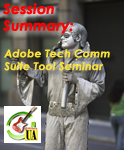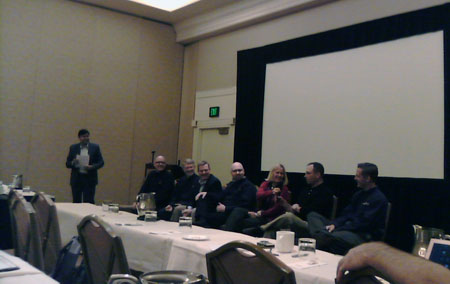 During WritersUA 2012, Adobe® hosted a tool seminar with several presenters, each one speaking to a unique feature or in more detail on a feature of Technical Communication Suite (TCS). The package allows for authoring DITA-compliant content in FrameMaker®, publishing to multiple outputs with RoboHelp® and Captivate®, and adding images, demos or simulations with Photoshop® and Captivate. Outputs include print, PDF, EPUB, AIR®, WebHelp, XML and HTML.
During WritersUA 2012, Adobe® hosted a tool seminar with several presenters, each one speaking to a unique feature or in more detail on a feature of Technical Communication Suite (TCS). The package allows for authoring DITA-compliant content in FrameMaker®, publishing to multiple outputs with RoboHelp® and Captivate®, and adding images, demos or simulations with Photoshop® and Captivate. Outputs include print, PDF, EPUB, AIR®, WebHelp, XML and HTML.
One speaker demonstrated how to pull a Word doc into RoboHelp, which allows you to map the Word styles, or to use the auto-apply feature. RoboHelp’s mapping and auto-apply features are important because inset styles from Word don’t work well when you add or adjust text in RoboHelp. You can mitigate this by telling RoboHelp which cascading style sheet (CSS) to apply to avoid default settings. If you haven’t already set up your own CSS, you can apply your own styles and match to Word styles and save as a CSS that can be reused. Adobes recommends minimizing the number of styles by stripping out extraneous ones when importing content to a new Word doc—import only the styles required in the CSS. You can also set up RoboHelp to set the CSS to split a document at a particular style to designate a new topic.
The speakers pointed out a couple of caveats when working with Word and RoboHelp to produce user assistance. First, if you reopen to tweak, you may have to reapply the CSS, because RoboHelp may think it needs to create a new CSS. Second, problems with lists in Word are compounded when imported into RoboHelp. The recommended fix is to correct the indents with HTML and apply to your CSS to fix every occurrence, even new ones.
Going mobile was a frequent topic at WritersUA and Adobe first addressed it. Because RoboHelp supports so many outputs, you can use for mobile user assistance as well, publishing to EPUB from FrameMaker. It also allows for publishing to Mobi (for Kindle) although because it is not yet a direct output you will need to take an extra step.
Maxwell Hoffmann, product evangelist for Adobe TCS, suggested TCS as an answer for single-sourcing. You can use RoboHelp to publish, even within FrameMaker, and take advantage of the ability to link FrameMaker and Word docs to update content in those authoring programs. Then just run an update in RoboHelp to have it match. Hoffman said that performing these single sourcing steps to EPUB will save on translation costs as it is billable and in many cases requires fewer steps than competitive products. Tech Comm Suite allows a single set of source files in FrameMaker to be translated, and the translation agency can simply generates the Help output in RoboHelp via Tech Comm Suite from the linked, translated FrameMaker files.
Another Adobe representative presented a third feature of the newest RoboHelp— allowing linkage and searching of external content. Essentially, you can merge different files, including web content and PDF and FrameMaker, searching for and grabbing what you need. You can create meta tags for searches and synonyms, and can even add misspellings, so that when a user does a search in the help you create, you control the priority search results.
The next presenters showed how to use RoboHelp/RoboHelp Server as a library repository, adding conditions/identifying content pieces as conditional. The project described used conditional expressions in RoboHelp to output Policy & Procedure Manuals, or internal training materials from the same source files. Conditional expressions also allow you to create a table of contents based on page/user that outputs much of the same content with some topics added or removed.
RoboHelp Server compliments regular RoboHelp and resides on a Windows or TomCat (open source) Web server to collect traffic and search data. Since it is a Web app, it can be accessed online rather than installed on individual desktops. Server also extends Google Analytics by providing feedback analytics on your user assistance, such as what users are doing, where they are stopping, while referencing by area, and allowing for protected access to designated areas. It can rank search results based on feedback analytics, but does not currently track index use.

Panelists at the WritersUA Adobe Tool Seminar
You can use this feature for addressing localization by identifying synonyms for a word, then when a user searches, he/she will see the word searched for and RoboHelp will highlight/outline the equivalent existent word in the topic area.
The tool seminar ended with panel of seven of the speakers who responded to questions based on their specific areas of knowledge. Looking forward, the panel predicted that, like the word count and reading level in Word, we’ll have a plain English meter for translation and guesstimating screen size for going mobile. Another panelist referred to a YouTube video “A Day Made of Glass”, which highlights the future of digital displays on any number of glass surfaces. Other panelists pointed to social media, EPUB and more as significant trends that are and will continue to impact the development of user assistance.